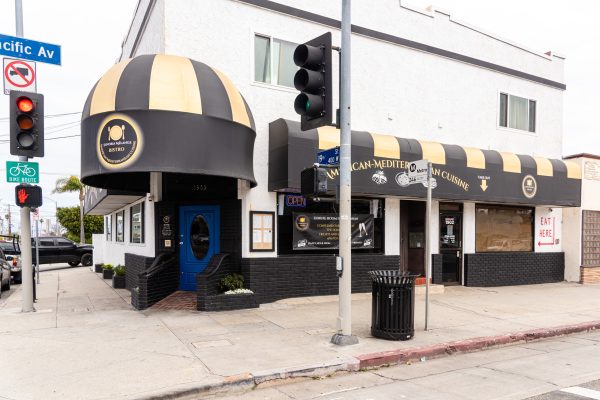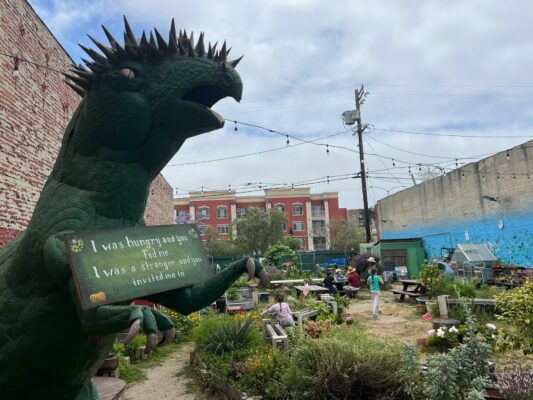by Kevin Cody
After having been in legal limbo since the lifting of COVID restrictions, Hermosa Beach’s outdoor dining on public property was given a pathway to permanency at Tuesday night’s city council meeting.
“That’s permanency with a small ‘p,’” Mayor Jackson repeated throughout a four hour discussion, spent hammering out a consensus on the sizes and fees for outdoor dining encroachments. The council also agreed to make permanent the Pier and Hermosa avenues lane reductions, from two lanes in each direction to one lane in each direction. The lane reductions were instituted at the start of COVID to make room for dining decks and bike lanes on downtown streets.
Paving the way for the permanent outdoor dining accommodations was a meeting Tuesday afternoon between Councilmembers Mike Detoy and Justin Massey. The two had expressed opposing views on outdoor dining during previous council meetings.
“Saeman was my ‘Brown Act’ buddy, but we couldn’t agree on anything,” Mayor Raymond Jackson quipped after Detoy and Massey disclosed their meeting, which had included city environmental programs manager Doug Krauss. The State Brown Act prohibits a majority of elected officials from discussing public issues in private.
The council agreed with Detoy’s and Massey’s proposal that dining deck sizes be determined not by restaurant frontage, but by restaurant parcels. City Staff had proposed Pier Plaza dining patios be limited to 1,000 sq. ft. per restaurant. Detoy and Massey proposed limiting the sizes to 1,000 square feet per restaurant parcel. As a result, large pier plaza restaurants, such as Hennessey’s Tavern and American Junky, because they are two parcels wide, will be allowed 2,000 square foot patios on Pier Plaza.
Restaurants on Hermosa and Pier avenues will be allowed 500 square foot dining decks in what was formerly metered parking.
The dining encroachment fees proposed by Detoy and Massey, and agreed to by their fellow council members, will be phased in over three years.
For restaurants that serve alcohol, and are open until 2 a.m. the monthly dining encroachment fees will be $4/sq.ft in year one, $5/sq.ft. in year two, and $6/sq. ft in subsequent years
For Pier Plaza restaurants that close by 11 p.m., the respective monthly sq.ft rates will be $2, $3, and $4
The respective monthly square foot rates for Pier and Hermosa avenue dining encroachments and for establishments on Pier Plaza that do not serve alcohol will be $1, $2, $2.50.
In deference to restaurant owners who asked that rate increases be delayed until after summer, to give the restaurants more time to recover from COVID, the council agreed to delay the increases until July.
The council did not reach full consensus on making permanent the narrowing of Hermosa and Pier avenues to one lane in each direction.
Councilman Bob Saeman, a former planning commissioner, reminded fellow councilmembers that when an earlier council reduced Hermosa and Pier avenues to one way in each direction “residents hated it,” and forced the council to reverse the decision.
“I’m a firm believer in outdoor dining decks. But I don’t think lane reductions are needed for dining decks.”
“Downtown Manhattan Beach streets are single lane (in each direction), and it takes 15 minutes to slog through Manhattan Beach. Single lanes are a problem for emergency vehicles.”
“Pier Avenue is the gateway to the city. The first view shouldn’t be of a traffic jam. I live 100 feet off of Pier Avenue, and people drive through the neighborhoods to get off of Pier Avenue.
“Four lanes worked well for 50 years,” Saeman said.
Saeman proposed revisiting another, earlier council’s proposal to make Pier Avenue sidewalks 20 feet wide so tables could be set on the sidewalk, instead of in the street. That plan was also rejected by earlier residents who feared sidewalk dining would be too noisy.
A second issue the council split on 4 to 1, Tuesday night, was staff’s recommendations of a ban on lines in front of restaurants.
The ban was instituted to reduce the spread of COVID, and remains in effect on a temporary basis until Council votes on a permanent solution.on a temporary basis until Council votes on a permanent solution.
‘I’m not certain a ban on lines needs to be in this ordinance. There are always lines at Java Man and Good Stuff,” Jackson said.
“I agree,” Saeman said. “Comedy and Magic Club always has a line. So does Fritto Misto. Lines are not a problem.
Francois also opposed a ban on lines.
Chief Paul LeBaron told the council that lines have become “a modern day public safety problem,” because “mass killings are proceeding at a record rate.”
“Vehicles have become mass killing machines that target open air gatherings. We need to prevent that potential,” he said.
The argument swayed all but Francois in favor of banning lines. City Manager Suja Lowenthal said accommodations could be made for Comedy, and Magic Club, The Lighthouse, and for special events.
“Businesses will have to find a way to utilize technology. I go to restaurants at The Point in El Segundo. I take a number, and wander around to the shops until I’m texted that my table is ready. It’s not difficult operationally,” Massey said.
“What we’ve done isn’t perfect, but it’s a good start. Let’s not let perfect be the enemy of good,” Jackson said in praising the city’s efforts to make the dining decks permanent. ER









